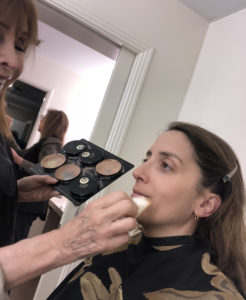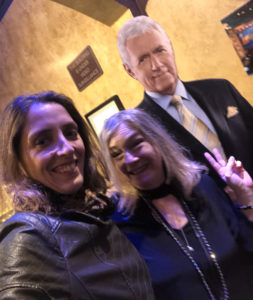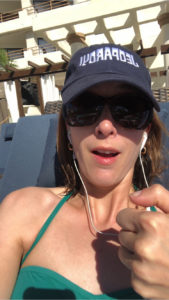“I’ll take HAPPY ‘TRAIL’s for $1,000, Alex.”
[Alex Trebek’s dulcet tones read out the clue that appears on a glowing blue screen.] “Answer: This term describes someone who moves for a romantic partner’s career.”
[Me, buzzing in confidently and turning the game into a runaway in my favor.] “What is a Trailing Spouse?”
Ah, if only I had gotten that question — or landed on even one Daily Double! — during my one-and-done appearance on America’s favorite quiz show last year. My first “Jeopardy!” tapiversary came and went this week, and I couldn’t help but sigh at the bittersweet memory of 22 months of daily preparation culminating in 22 minutes of buzzer thumb frustration… then laugh from my new home in Delhi at how much difference a year can make.
Merry Christmas! Time to vote?

Most game show contestants describe the experience as surreal. It’s hard to explain all the behind-the-scenes details, not to mention the confusing logistics of taping only on Tuesdays and Wednesdays — five “Jeopardy!” episodes each day — then airing them over a month later.
(For example, if the show references a current holiday? Keep in mind that the actual taping took place weeks ago, and therefore everyone is awkwardly pretending to be in the future.)
All those returning champions in bright new clothes and fresh makeup? Unless you’re watching on a Monday, they’ve just returned to the stage after frantically changing into one of the five outfits they brought from home. If the episode is airing on a Thursday or Friday? Watch carefully, and you may notice the post-lunch slump.
But I suspect the experience of competing in early November 2018 (episodes aired in late December) was exceptionally bizarre. Halfway into the Tuesday, Nov. 6 taping — during which Alex Trebek repeatedly reminded everyone to go vote, then shared a lengthy tale of his DIY home repair battles against woodpeckers — we discovered that our returning champion Jackie Fuchs was actually bass player Jackie Fox from The Runaways. For the three of us held over for the Wednesday, Nov. 7 taping, joined by a dozen new frenemies, we gasped over the added absurdity of Alex turning to the studio audience during a commercial break to gravely pronounce, “Jeff Sessions has just been fired.”
In all my years as a journalist, I never could have imagined getting Election Day updates and breaking news from Alex Trebek. Then again, I never expected to move to Silicon Valley, or Seattle, or India — or to compete on “Jeopardy!” I hadn’t grown up watching the show, I hadn’t played trivia since high school, I hadn’t been trying out for years, and the only J! champions I had ever heard of were Ken Jennings (because, obviously) and Brad Rutter (because I went to college with his brother Greg). Basically, I had spontaneously picked “get on Jeopardy!” as my 2017 New Year’s resolution in an effort to anchor all my random hobbies, interests, and bucket list pursuits, while distracting myself from Donald Trump’s impending presidency.
All this made me feel like a complete outsider among the brainiacs I got to know throughout the audition process, through my networks, and via social media. As I began cramming blog posts and books by J! champions (my favorite is “Prisoner of Trebekistan” by Bob Harris), blazing through flashcard and trivia apps, becoming a regular at my neighborhood dive bar’s weekly quiz night, and asking Alexa to “play Jeopardy!” first thing every morning? I quickly realized that although the J! fan subculture was foreign to me, my trailing spouse life had nevertheless given me a competitive edge — both directly and in a “Slumdog Millionaire” kind of way.
Spare time for sticky stuff
For your consideration: Every time you move to a new city, state, or country, you’re immersed in new geography, history, language, food, literature, sports teams, and other popular trivia categories. These are all things you could learn by studying, of course, but info tends to become more “sticky” whenever it’s gained through personal experience.
Due to legal restrictions or other complications, we trailing spouses often have to pause our own careers due to our partner-prompted relocations. Once the dust settles, we find ourselves with an overabundance of free time, a scarcity of local connections, and growing concerns about keeping ourselves marketable during this employment gap. What to do? We go sight-seeing, take classes, pursue new hobbies, volunteer, hang out in pubs, read more books, watch more TV, try new recipes, play with our kids, etc. All of the above is positively brimming with J! question material.
If getting on “Jeopardy!” happens to be on your bucket list anyway? That’s at least one goal you can pursue seamlessly from anywhere, no matter how often or unpredictably you move. The 50-question applicant test is now administered online, several times a year.
If you score well enough (at least 36 correct questions, depending on the curve), you’ll be invited to an audition in the North American city you designated as your most convenient option. Assuming you do well there, you’ll be entered into the contestant pool for 18 months. You won’t ever have to physically get to Los Angeles unless you’re called up and given the 3-6 weeks advance notice to participate in a taping. If you can’t make it for your assigned date due to a relocation or other travel plans (this happened to me in Summer 2018), you’ll be put back into the contestant pool and hopefully called up again the next time they need your type (e.g., gender, profession, region).
Location, location, location
According to my informal poll of J! alumni on Facebook, more than one-third have been trailing kids or spouses. Several alerted me to another competitive advantage we share: geographic flexibility.
Some U.S. cities hold auditions more frequently than others; some are more competitive than others. It’s also an open secret that the show aims to have a different TV market represented by each of the three contestants — ideally, at least nine different “hometowns” every week, including a Southern Californian who appears every other Friday (the last episode of the Wednesday taping) to give the show a one-third chance of not having to cover a returning champion’s flight and hotel cost.
(Your mileage may vary, but these are among the myriad subtleties that J! hopefuls and superfans track carefully.)

As romantic partners and travelers, trailing spouses also have plenty of interesting stories to offer up for the “contestant interview” part of the show. You may not believe this, given how stilted these little chats can seem, but we have to provide at least five options for Alex to choose from before those 15 seconds of fame; I’ve observed that anecdotes related to married life and interesting vacations most often make the cut. (Perhaps The Jeopardy Fan or Cool Jeopardy Stories can back this up with some data?)
If you’ve been a trailing spouse, you also know how to mask anxiety and power through awkward conversations with strangers! All else being equal academically, it’s the J! hopefuls who can smile for the cameras and make above-average small talk who are most likely to find themselves getting “the call” and being effusively welcomed to that chilly Culver City studio by producer Maggie Speak.
Learning along the way
Whether we tackle this subject from the top down, bottom up or by bouncing around the board? Being a trailing spouse definitely made me better on “Jeopardy!”
For starters, I strongly doubt I would have even thought of going on the show if my husband’s career hadn’t moved us from Manhattan to Seattle, where Ken Jennings is a major local celebrity and playing trivia is part of the ecosystem. If I had somehow become inclined to try out from New York City at some point in the past decade? I presumably would have had more competition, given the exponentially larger population, and I wouldn’t have stood out as much at my audition; a chatty Greek American lady with a hint of a Bronx accent is kind of a rarity in the Northwest!
Had we stayed put, I probably wouldn’t have gotten involved with Toastmasters International, the public speaking program I joined in order to meet people and reenergize my career. Not only did this give me the confidence to envision myself speaking out from a podium on national TV, but members of my Emerald City Toastmasters club cheered me on and even helped me study — and later created an abridged version of the game to play during the “Table Topics” 90-second extemporaneous speaking portion of our meetings. Hear, hear!
The very first category, “Not for Profit,” felt like a clear shout-out to my hard-won transition from journalism to the nonprofit sector, necessitated by that 2009 move from the Northeast to the Pacific Northwest. (Seattle was not the most ideal destination for a Religion News Service and New York Times correspondent, especially in the aftermath of the sudden demise of one of its two daily newspapers.)
Thanks to my years as an “S.O.” during my husband’s MBA studies in Silicon Valley, the “Very Definitely For Profit” category also came easily. And my “Who is Shepard Fairey?” response, jumping me from third to second place in the game’s final moments, came out of my Seattle connections to the artist’s social justice work.
In hindsight, I should have spent 2017-2018 studying a lot less and instead strengthening my buzzer thumb reflexes by playing Xbox and Nintendo with my son!
Always go all in

Do I wish my experience had gone differently? Of course. As I’ve learned in the 12 months since my taping, most J! alums feel disappointed after their final Final Jeopardy! — whether it’s after taping just one episode or at the end of a hot streak. The show beats everyone eventually, even mega-champs like Ken Jennings and James Holzhauer. Tears are shed, teeth are gnashed.
Anyone who makes it onto the show — a tiny fraction of the 80,000 people who try out every year — knows most of the answers on the board, after all. We’re haunted by “what if” and “if only” and podium-position conspiracy theories, mostly in our own minds but also by Twitter and random people we meet at the supermarket. We have love-hate relationships with our commemorative baseball caps and tote bags, and can’t seem to stop compulsively clicking on pens. Some of us never watch the show again, even for the “Tournament of Champions.” (Go Emma!)
But being a trailing spouse also teaches resilience.
Upon reflection, most of the knowledge I gained through my copious J! preparations is stuff I’m glad to have at my fingertips. (Not every single world capital, state and country flag, Shakespeare character and sports team mascot has stuck with me, but it’s still gratifying to be smarter than a fifth grader — especially as a parent.) And I’m grateful that my global network has expanded to include all the brilliant people I met during my taping and through our alumni groups. Thanks to these connections, I was able to give RNS the scoop on Rabbi Geoffrey Mitelman’s plans for a clergy contestant prayer vigil in response to Alex Trebek’s pancreatic cancer diagnosis earlier this year; Eric Doctor, the graphic designer and Shrug Man from my first taping day, helped advise me on this website’s logo.
Trailing spouses truly understand the significance of luck and timing in life, the value of taking risks and going “all in,” and that you never know who or what might become helpful or useful down the road. After 36 seasons on the air, there are also J! alumni all over the world to advise you — not just about competing on “Jeopardy!” but also about your new “hometown.” Out of habit, we’re more likely than most to know its major historical sites, sports team mascots, and pub trivia schedule!
And if you’re a trailing spouse who loves filling your brain and now needs to fill up some spare time, too? I’d be happy to offer more advice related to getting on “Jeopardy!” — or other not-so-trivial pursuits. Reach out via Facebook or by emailing hello@trailing-spouse.com.


